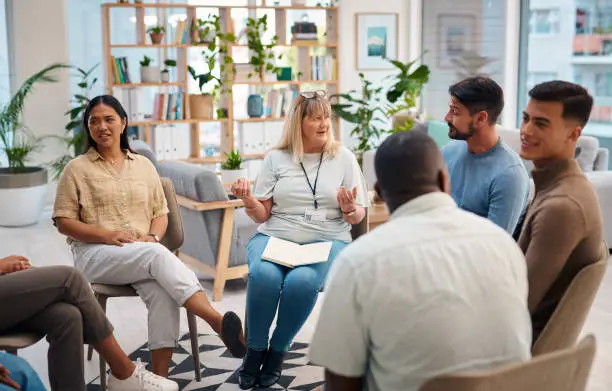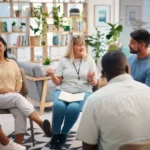In today’s fast-paced, digitally connected but emotionally disconnected world, many people silently battle with anxiety, depression, trauma, or major life transitions. One of the greatest misconceptions is believing that no one else understands what you’re going through.
But that’s not true — and group therapy is living proof. 💬
Group therapy creates a powerful and supportive environment where individuals facing similar challenges come together, not just to talk, but to heal collectively. Whether you’re navigating grief, recovering from addiction, struggling with self-worth, or managing stress, group therapy offers an empathetic space filled with people who get it — because they’re living it too.
💬 What Is Group Therapy? (And How Is It Different?)
Group therapy is a form of psychotherapy involving a small group of participants (usually 6 to 12 people) who meet under the guidance of one or more trained therapists. Unlike individual therapy, where it’s just you and a therapist, group therapy brings the added value of peer support and shared experience.
Types of Group Therapy:
- 🧠 Cognitive-Behavioral Groups – Focus on thought and behavior patterns. Great for anxiety, depression, and OCD.
- 🧘 Mindfulness or DBT Groups – Use meditation and emotional regulation techniques. Ideal for stress, BPD, trauma recovery.
- 💬 Support Groups – Often peer-led or semi-structured, these focus on shared life experiences (grief, divorce, chronic illness).
- 👨👩👧 Interpersonal/Process Groups – Explore real-time interactions among members, helping with relationship issues, communication, and self-awareness.
🔄 Group therapy can be open (new members can join anytime) or closed (a set group for a specific time).
🌟 1. Shared Experience Creates Emotional Relief
One of the most immediate and powerful benefits of group therapy is the realization that you’re not alone.
🙍 “I thought I was the only one with panic attacks in public.”
🙋♀️ “I get that too — it hits me at the grocery store.”
This shared recognition is often the first step toward healing. It helps reduce:
- ❌ Isolation
- ❌ Shame
- ❌ Self-blame
People in the group often validate each other’s experiences, leading to deep emotional relief. You’re no longer the only one — you’re part of a tribe.
💬 “Just hearing someone else say what I’ve been thinking helped me breathe again.”
🧠 2. Gain New Insights & Coping Strategies
Every person in a group comes with their own story, their own journey, and often their own toolbox of coping skills. This creates a rich learning environment where:
- You hear new ways to manage your emotions
- You get honest, constructive feedback
- You reflect more deeply on your own behaviors
🔍 Example: You might hear how someone else with social anxiety learned to handle awkward conversations — and realize that it could work for you too.
And sometimes, you may see your own patterns reflected in someone else’s story. That mirror effect allows for growth you might not reach in individual therapy alone.
🛠️ 3. Build Real-Life Relationship Skills
One major challenge many people face is difficulty in relationships — whether it’s setting boundaries, communicating feelings, or dealing with conflict.
Group therapy gives you a real-time laboratory to:
- Express emotions safely 😢🙂
- Practice active listening 👂
- Learn to give and receive feedback respectfully 🗣️
- Notice your own triggers and patterns 🔁
- Build empathy by understanding others’ perspectives ❤️
You don’t just talk about change — you practice it with real people.
🧘 4. Safe, Supportive, and Confidential
A common fear before starting group therapy is: “What if I say something too personal?”
Therapists establish clear group rules to protect every participant:
- Confidentiality is strictly maintained
- Judgment-free atmosphere is a must
- Respect and active listening are required
This creates a space where members can truly open up without fear. Vulnerability is respected, and your courage is celebrated. 🌈
Many people are surprised by how quickly they feel emotionally safe — often within just a few sessions.
🧭 5. Affordable and Accessible Support
Let’s talk logistics. 💰
One-on-one therapy can be expensive, and not everyone has insurance coverage or access to a private therapist. Group therapy:
- Costs significantly less per session
- Offers more hours of support per dollar
- Is available in community centers, hospitals, schools, and online platforms
🎯 Many groups also offer sliding-scale fees or are covered by health insurance.
💡 Online group therapy has also expanded access dramatically, allowing people from remote or rural areas to participate from home — safely and conveniently.
🌍 6. A Sense of Belonging and Purpose
Sometimes, healing happens in the moment you realize you can help someone else, too.
Group therapy isn’t just about being helped — it’s about helping. When you share advice, offer empathy, or support someone else’s progress, it gives your pain a sense of purpose. 💪
🧡 Belonging to a group over time can create friendships, accountability, and emotional connection that often extend beyond therapy.
This collective healing fosters not just mental health but also community wellness.
📣 7. Real-World Stories: The Impact Is Real
“Group therapy didn’t just teach me how to cope. It gave me people who actually understand my journey. That’s something I didn’t know I needed.” – Leah, 33
“I was terrified to talk at first, but watching others speak made me brave. Now I look forward to every session.” – Omar, 25
“It wasn’t just therapy — it was a turning point.” – Michelle, 46
🔍 Who Should Consider Group Therapy?
You might benefit from group therapy if:
✅ You feel isolated or misunderstood
✅ You want to connect with others facing similar issues
✅ You’re navigating grief, addiction, illness, anxiety, or life changes
✅ You’re looking for more affordable therapy
✅ You’re open to listening, sharing, and growing with others
⚠️ Not all groups are right for everyone. A brief consultation with a therapist will help determine if group therapy suits your current needs and emotional state.
🔮 The Future of Group Therapy: Hybrid Healing
As mental health services evolve, we’re seeing exciting developments like:
- 💻 Virtual support groups (especially after COVID-19)
- 🧬 Specialized groups for specific communities (LGBTQ+, veterans, young adults, trauma survivors)
- 📲 Apps and platforms that connect you with therapy groups by location or topic
- 🧠 Psychoeducational groups that blend therapy with skills training (e.g., emotional regulation, mindfulness)
This makes group therapy more diverse, inclusive, and accessible than ever.
✨ Final Thoughts: You’re Not Alone — And You Never Were
Life can be hard. Mental health struggles are real. But suffering in silence doesn’t have to be your story.
Group therapy reminds us that healing happens in community. It teaches us that we are not weak for needing support — we are strong for seeking it. 💪💬
So if you’ve been waiting for a sign to try something different, this is it. Join a group. Speak your truth. Listen with your heart. And let the journey to healing begin — together. 🧡🌱
📚 Resources & Where to Start (2024–2025):
- American Group Psychotherapy Association (AGPA) – https://www.agpa.org
- Psychology Today – Search for local or virtual therapy groups by issue: www.psychologytoday.com
- National Alliance on Mental Illness (NAMI) – Offers peer-led support groups and resources: www.nami.org
- BetterHelp & Talkspace – Online platforms offering therapy and group sessions
- TherapistReferrals.org – Find therapists offering group therapy by specialty







Leave a Reply